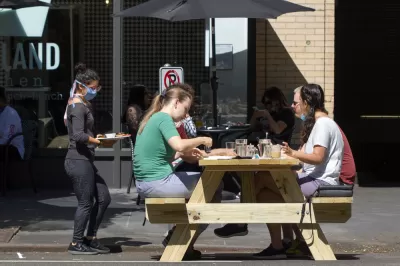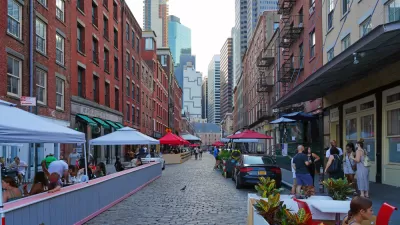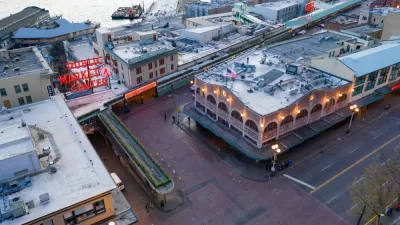It took a pandemic, but the worldwide effort to move restaurant and retail businesses outside, at the expense of parking, is proving far less controversial than it would have before the coronavirus swept the globe.

Something strange happened this summer, according to an article and radio broadcast for NPR by Camila Domonoske: the usual outrage when cities remove on-street parking in commercial areas hasn't materialized.
"Just ask Randy Rucker, the chef and owner of River Twice on East Passyunk Ave [in South Philly]. The restaurant placed tables in the street where as many as four cars used to squeeze in, in a neighborhood where every parking spot is prized."
The expected backlash never materialized. Rucker says it's been a positive experience.
Rucker is the owner of one of more than 400 businesses in Philadelphia to take advantage of the city's program to allow businesses to set up tables in parking lots—a program the city might extend throughout 2021. But cities all over the world are taking similar steps to lessen the footprint of cars in the public realm, with similarly less-than-controversial results.
So what explains the strange lack of controversy as businesses reclaim parking spots to operate during the pandemic? One explanation could be the lower traffic levels in general. "According to mapping company TomTom, Philadelphia's streets are about half as congested as they were pre-pandemic," writes Domonoske. Other sources confirm that vehicles miles traveled has plateaued below pre-pandemic levels in the United States.
"But even people who are driving and who still feel frustration over parking aren't protesting against the restaurant expansions," writes Domonoske. "One big reason why: They know the pandemic poses an existential threat to local restaurants."
For more on the planning and design specifics of "al fresco streets," see earlier coverage by Planetizen:
- Reopening Main Street (May 2020)
- Beyond Complete Streets: Could COVID-19 Help Transform Thoroughfares Into Places for People? (September 2020)
FULL STORY: Street Food: Cities Turn Parking Spaces Into Dining Spots And No One Seems To Mind

Planetizen Federal Action Tracker
A weekly monitor of how Trump’s orders and actions are impacting planners and planning in America.

Congressman Proposes Bill to Rename DC Metro “Trump Train”
The Make Autorail Great Again Act would withhold federal funding to the system until the Washington Metropolitan Area Transit Authority (WMATA), rebrands as the Washington Metropolitan Authority for Greater Access (WMAGA).

The Simple Legislative Tool Transforming Vacant Downtowns
In California, Michigan and Georgia, an easy win is bringing dollars — and delight — back to city centers.

The States Losing Rural Delivery Rooms at an Alarming Pace
In some states, as few as 9% of rural hospitals still deliver babies. As a result, rising pre-term births, no adequate pre-term care and "harrowing" close calls are a growing reality.

The Small South Asian Republic Going all in on EVs
Thanks to one simple policy change less than five years ago, 65% of new cars in this Himalayan country are now electric.

DC Backpedals on Bike Lane Protection, Swaps Barriers for Paint
Citing aesthetic concerns, the city is removing the concrete barriers and flexposts that once separated Arizona Avenue cyclists from motor vehicles.
Urban Design for Planners 1: Software Tools
This six-course series explores essential urban design concepts using open source software and equips planners with the tools they need to participate fully in the urban design process.
Planning for Universal Design
Learn the tools for implementing Universal Design in planning regulations.
Smith Gee Studio
City of Charlotte
City of Camden Redevelopment Agency
City of Astoria
Transportation Research & Education Center (TREC) at Portland State University
US High Speed Rail Association
City of Camden Redevelopment Agency
Municipality of Princeton (NJ)




























